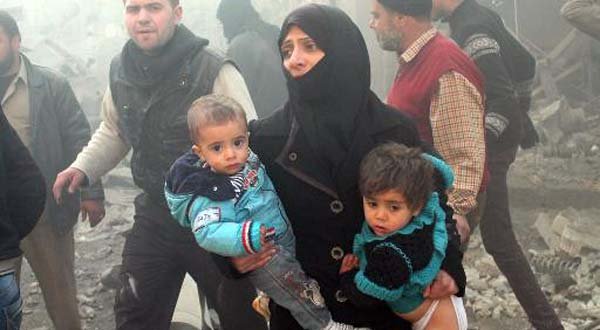
DAMASCUS, March 16, 2014 (IINA) – Three years on, the Syrian conflict’s dynamics have changed, activists and analysts concur. Influential groups, with vested interests in a prolonged conflict, have become major players, jeopardizing an end to the violence either through regime change or a power sharing agreement, Al Arabiya News reported. “Basically, the brigades who control the borders, the oil fields, the car and drug mafias, all wish for a never-ending conflict,” said Moayed Bitar, a Latakia activist, who participated in the 2011 demonstrations in his hometown, al-Haffa.
What bedazzles him the most are the common business interests across the battlefield, especially the free movement of merchandize, often stolen, on certain fronts. “In the rebel-controlled al-Ghab region,” Moayed says, “there is a known Mafia leader who transports stolen cars through regime checkpoints.” ‘War merchants outnumber the fighters’
The conflict seems eternal at times, notes Hussam Zeyadeh, an activist from Daraya, a Damascus suburb plagued by destruction and a regime massacre that killed hundreds.
“There are the Shabiha, the regime’s paramilitary group, the local defense committees, the smugglers – the war merchants outnumber the fighters,” he says. Certain regime figures have grown richer. In Daraya, a known regime-affiliated businessman resells debris from destroyed parts. “Some brigade leaders are more interested in prolonging the war to keep the money flowing from regional powers,” Zeyadeh added. While the numbers on the rebel side are unclear, the foreign loyalties are usually suggestive, as seen in prisoner swap deals, where regional powers “seal the deal,” and their proxies execute on the ground.
Black markets
On the regime’s side, Russia and Iran have both supported the Syrian government’s finances. According to a recent report. “Tehran has proved key in propping up Syria’s economy, extending the regime a $3.6 billion credit line in July.” But just how big this black market is remains unknown.
The economy has shrunk by 40% since the revolution. Billions of dollars are poured in by regional powers to support both the rebels and the regime. As the trade deficit doubles every year since the revolution, and Aleppo factories sold in Turkey, Syria has become an importing nation, creating a new class of war merchants, with strong connections with the regime and rebels.
The fighting in the North has lost its lust. Many Syrian activists mock the Battle of Wadi al-Dayf in Idlib, now in its fifth round, calling it “Wadi Al Zi’ab,” in reference to the name of a popular never-ending Turkish Soap, with hundreds of episodes. Activists, who asked their names to remain anonymous for fear of reprisal, believe rebel leaders and opposition figures have become corrupt, leading lifestyles similar to regime officials, with mistresses in Turkey and five star hotel stays, according to their sources.
These activists, once empowered by a revolt that broke the norms, now feel powerless, sometimes bewildered, as the conflict looks static, with no end in sight. Regional support for both the regime and certain rebel groups, means that Syrians, like their fellow Lebanese, have little say in their affairs. The death toll has topped 140,000, half of the population displaced, and nearly 50% living under the poverty line. But the Syrian revolution remains, Hussam Itani, an al-Hayat columnist, insists. The revolution, Itani said, has eroded the basis of the Mafia/family rule in Syria, and uncovered many contradictions in the Syrian society.
“For five decades, the Baath regimes have insisted that the Syrians constitute a homogeneous society that has surrendered its destiny to a wise leadership, and that has no internal concerns but to confront imperialist and Zionist conspiracies,” said Itani. The revolution’s legacy might be intact in theory, but activists, like Moayed, want it back on its original track. “We need a second revolution against the war merchants,” he said.

